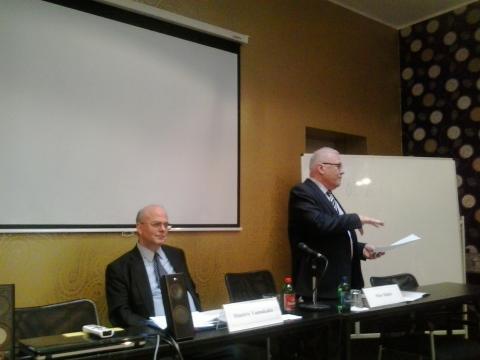Event Report – “Priorities of the Hellenic Presidency of the Council of the European Union”

CEU’s Center for EU Enlargement Studies (CENS), the Embassy of Greece in Hungary, and the CEU Rectorate hosted second Ambassadorial Lecture Series event of 2014 on 27 February entitled “Priorities of the Hellenic Presidency of the Council of the European Union”. The lecture was delivered by Ambassador of Greece to Hungary, H.E. Mr. Dimitris Yannakakis, to a distinguished group of diplomats, ambassadors, students and university professors. The lecture was chaired by Péter Balázs, Director of CENS and former Hungarian Minister of Foreign Affairs.
Greece holds the Presidency of the Council of the European Union in the first half of 2014, before handing it over to Italy on 1 July 2014. Ambassador Yannakakis explained that this is the fifth time that Greece holds the Presidency since its accession to the European Communities in 1981. Greece assumed the Presidency at a time when Europe is going through a crucial transitional phase. The financial crisis, as well as the level of recession and unemployment made this presidency the most inexpensive one so far.
The promotion of policies and actions for achieving growth, combating unemployment, promoting economic and social cohesion and structural reforms, deepening integration and completion of EMU, as well as addressing external challenges, formulated the priority framework of Hellenic Presidency, Ambasador Yannakakis said. There are four main priority areas:
1) Growth coupled with jobs and cohesion;
2) Further integration of the EU and eurozone;
3) Migration, mobility and border management;
4) Maritime policies, which will run horizontally through the Presidency’s priorities.
Although Greece’s presidency priorities do not include enlargement policy, Ambassador Yannakakis said that EU enlargement was one of the success stories for the EU, and that enlargement has always been and would continue to be a top priority for his country. He indicated that Greece would push each country’s case on an individual basis during the presidency, based on merit.
The lecture was followed by a lively question and answer session touching upon a variety of issues: Greek-Turkish relations, the current situation in Ukraine, the name issue of FYROM and many others.
